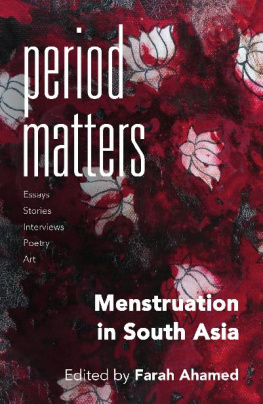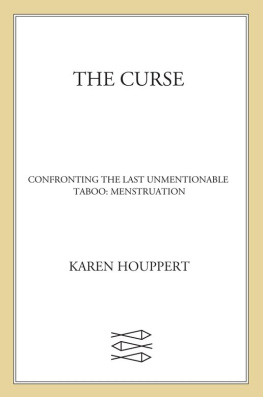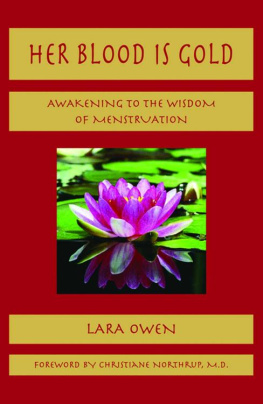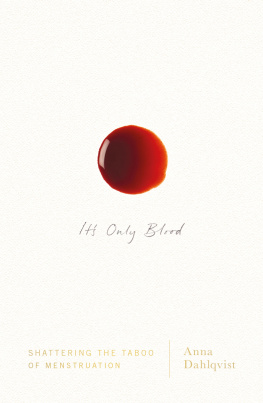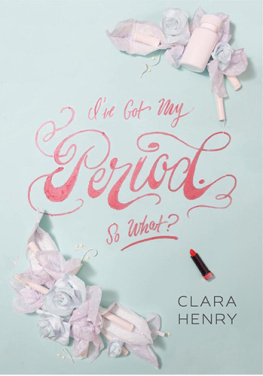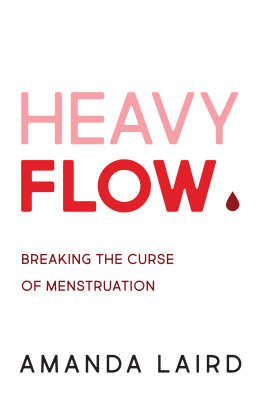
Dahlqvist masterfully moves between storytelling and frameworking how stigma holds menstruators back globally, while offering tangible solutions to many of these problems. A must read.
Kiran Gandhi, musician, activist, and free-bleeding runner at the 2015 London Marathon
An eye-opening and necessary book that will challenge your assumptions. Thought provoking, relevant and sensitively written.
Chella Quint, founder of #periodpositive
Brilliant. It was frustrating to realise how much there is to be done, but also inspiring to read about these groups of women all over the world working bloody hard toward the same ideal: that periods do not need to stand in the way of an education, a future, or a good life.
Gabby Edlin, founder of Bloody Good Period
Only when we call out the unnecessary shame and stigma that surrounds periods can we demand meaningful change. Dahlqvists deft, compassionate storytelling, and her critical global perspective, are a tremendous contribution.
Jennifer Weiss-Wolf, author of Periods Gone Public: Taking a Stand for Menstrual Equity
An insightful and inspiring read that will challenge you to think and behave differently.
Mandu Reid, founder of The Cup Effect
A lushly detailed and often intimate portrait of a global social movement. Whats more, Dahlqvists perceptive account reveals the insidious power of stigma to limit lives.
Chris Bobel, author of New Blood: Third-Wave Feminism and the Politics of Menstruation
A wide-ranging exploration of the enduring taboos surrounding menstruation, taking the author around the globe. What she uncovers in this provocative and insightful book will make us forever rethink our first world problems by putting periods in a global context.
Karen Houppert, author of The Curse: Confronting the Last Unmentionable Taboo
ABOUT THE AUTHOR
Anna Dahlqvist is a journalist specialising in gender, sexuality and human rights. She is editor-in-chief of Ottar , a Swedish magazine focusing on sexual politics, and has previously published a book on illegal abortion and abortion rights in Europe.
Its Only Blood
SHATTERING THE TABOO OF MENSTRUATION
ANNA DAHLQVIST
TRANSLATED BY ALICE E. OLSSON
Its Only Blood: Shattering the Taboo of Menstruation was first published by Bokfrlaget Atlas, Sweden, in 2016 under the title Bara lite blod: Ett reportage om mens och makt .
This edition published in 2018 by Zed Books Ltd, The Foundry, 17 Oval Way, London SE11 5RR, UK.
Published by agreement with the Kontext Agency.
www.zedbooks.net
Copyright Anna Dahlqvist 2016, 2018.
English language translation Alice E. Olsson, 2018.
The cost of this translation was defrayed by a subsidy from the Swedish Arts Council, gratefully acknowledged.
The right of Anna Dahlqvist to be identified as the author of this work has been asserted by her in accordance with the Copyright, Designs and Patents Act, 1988.
Typeset in Book Antiqua by Swales & Willis Ltd, Exeter, Devon
Cover design by Alice Marwick
Cover photo Saniphoto/Dreamstime
All rights reserved. No part of this publication may be reproduced, stored in a retrieval system or transmitted in any form or by any means, electronic, mechanical, photocopying or otherwise, without the prior permission of Zed Books Ltd.
A catalogue record for this book is available from the British Library
ISBN 978-1-78699-263-5 hb
ISBN 978-1-78699-262-8 pb
ISBN 978-1-78699-264-2 pdf
ISBN 978-1-78699-265-9 epub
ISBN 978-1-78699-266-6 mobi
To Stella, Sally, Esther, Thelma, and all other future, present, and former menstruators
CONTENTS
Menstruation is when part of the endometrium, a mucous membrane filled with blood, is shed and expelled from the uterus. Without a fertilised egg, the membrane serves no purpose. This process involving the endometrium, which prepares the uterus for a potential pregnancy, occurs approximately once a month. It is an experience shared by more than two billion people in the world. Every day 800 million people menstruate.
The shame is universal and the silence a global rule. This affects those of us who are menstruating in significant ways. We have to struggle to hide it, worry about being exposed, and feel ashamed when it happens. It prevents us from demanding more knowledge, better care, more effective menstrual hygiene products, lower prices, and more research. The silence strips us of our power.
Even though shame and silence are experiences shared by menstruators all over the world, the consequences become far more serious when an additional dimension is introduced: poverty. Managing menstruation requires resources. Hiding the blood becomes much more difficult if you lack menstrual products, water, toilets, and somewhere to be alone. If only for a brief moment. By extension, this means that many who menstruate and live in the poorest parts of the world, in Africa and Asia, cannot go to school, work, or move freely outside their homes. This, simply because they are menstruating. If they do so anyway, it may cost them dearly.
This intersection is what I have chosen to focus on in this book: what happens when menstrual shame clashes with poverty? Continuous human rights violations follow in the tracks of menstrual shame. Violations of the right to freedom and dignity. The right to equality. The right to education, health, and work.
My interviews were primarily conducted during visits to Uganda, Kenya, Bangladesh, and India in 2015 and 2016. In most cases, those who participate and talk about experiences of menstruation appear with their first names only. This is by their own choice. I use the terms woman and girl when I consider it relevant for understanding circumstances that arise from oppression along the categories of man and woman even though not all menstruators are women (for example, some are trans men).
The fact that we have talked more about menstruation in recent years is connected to a budding global menstruation movement. This movement is taking shape among activists, non-governmental organisations, and the media; to some extent it even reaches politicians and decision makers at the UN. What used to be unspeakable, consigned to the private sphere, is becoming politics. Menstruation is slowly being pulled into the light. But we have a lot of catching up to do.
Our bodies are celebrated when we bear children. But menstruation a prerequisite for pregnancy is something that we are expected to hide. Menstruating bodies quickly turn from miracle makers into polluters. The stain becomes a mark of shame.
Its only blood.
Dont you get angry when the boys laugh and tease you?
No.
But why not?
Theyre laughing because the girls cant keep themselves clean.
It is said as a matter of course, a simple stating of facts. Those who laugh are not doing anything wrong. The girls with the blood stains are. They simply have themselves to blame if they fail to hide the menstrual blood. If they cannot keep themselves clean.
Saudah herself has never been in that situation, never stood shameful in front of the others in the classroom. But she is well aware of the risk and of her own responsibility. Every month, she tries hard to make sure that the blood, which so persistently demands attention, remains invisible.


